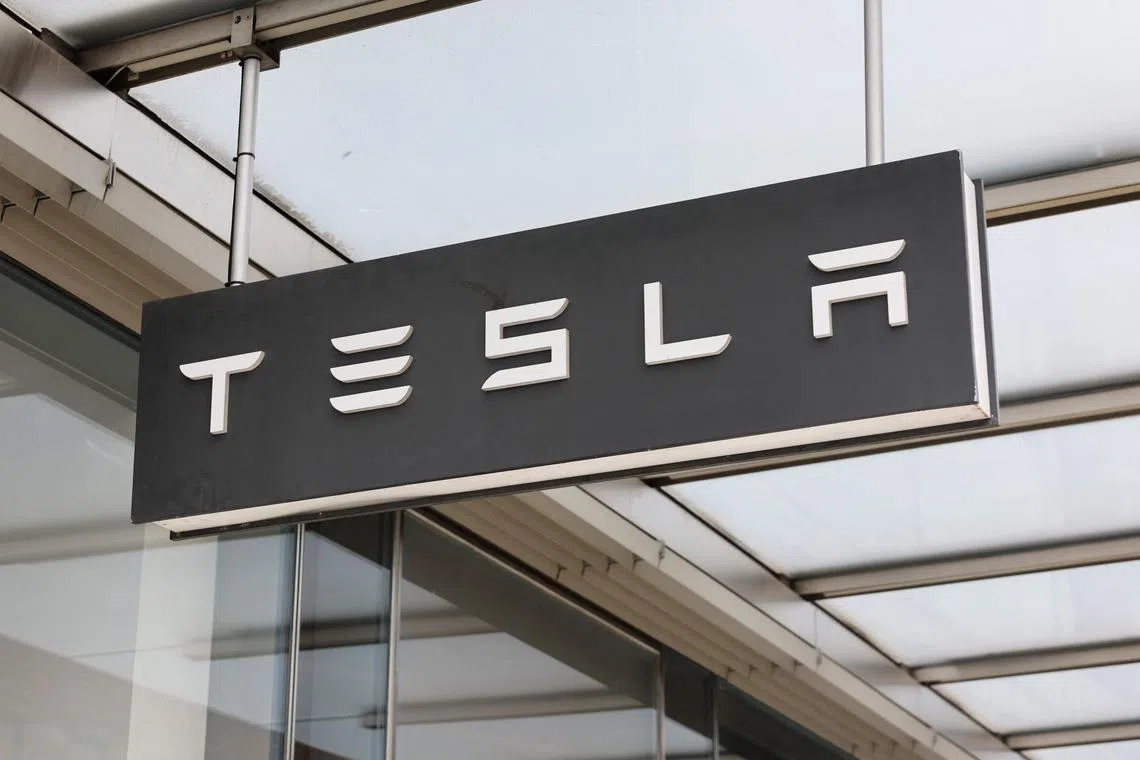Tesla shares see $80.6 billion wipeout after delay to robotaxi launch
Sign up now: Get ST's newsletters delivered to your inbox

Even before the news of the robotaxi delay, Tesla shares' gravity-defying rally was making some nervous.
PHOTO: AFP
New York - Tesla shares’ breathless rally hit a wall on July 11 on a report that the company might delay a crucial event that many investors have been pinning their hopes on. Yet even before that, it was already becoming harder to argue the case for the bulls.
The last time the company’s shares ran up like this, the rally was supported by revenue expanding at a double-digit clip. Things seem a lot gloomier now. The mood around electric cars is subdued, Tesla’s sales are shrinking and its profits are sagging.
And then came the big blow on July 11: Tesla is planning to delay its keenly anticipated self-driving technology – the robotaxi – to October, from August. The news sent the stock plunging 8.4 per cent, wiping off more than US$60 billion (S$80.6 billion) from its market capitalisation.
Even before the news of the robotaxi delay, the gravity-defying rally was making some nervous. The shares had soared 44 per cent through July 10 over an 11-day winning streak that’s the longest since June 2023. The stock was trading at 90 times forward earnings at its last close, a level that was last seen in early 2022, according to data compiled by Bloomberg.
The surge came as traders looked past Tesla’s electric vehicle (EV) credentials and bet that Mr Elon Musk can transform it into an artificial intelligence powerhouse. The idea was that when Mr Musk finally unveils Tesla’s robotaxi, it will solidify the company’s position as a leading AI player.
“Investors have been looking for that one breakthrough, real-world application of AI,” said Mr Nicholas Colas, co-founder at DataTrek Research. “And now we have someone who has been working on AI for years saying: ‘Hey, I have got that killer application.’”
Yet, some numbers fly in the face of the current buzz around the stock: earnings are set to drop by 21 per cent in 2024 and revenue growth is seen decelerating to just 2.2 per cent.
“This is clearly a faith-based stock now, not one whose valuations are in any way tied to current earnings power, and every day the stock rallies the bar for the event just gets higher,” Mr Colas added.
The frenetic rally, which prompted bond billionaire Bill Gross this week to compare Tesla to meme stocks, picked up steam after the company’s July 2 sales update suggested the worst of the EV slowdown may be over. But the surge has since taken on a wilder momentum.
Tesla is now the fifth-most expensively priced stock in the S&P 500 Index on a price-to-earnings basis, far surpassing the rest of the megacap technology cohort.
The glaring risk for investors is that for Tesla, success in AI relies on solving one of the most complex problems the technology has yet tackled – creating cars that drive themselves more safely than humans can. By and large, analysts and experts believe a real-world mass adoption of such technology is likely decades away. BLOOMBERG


